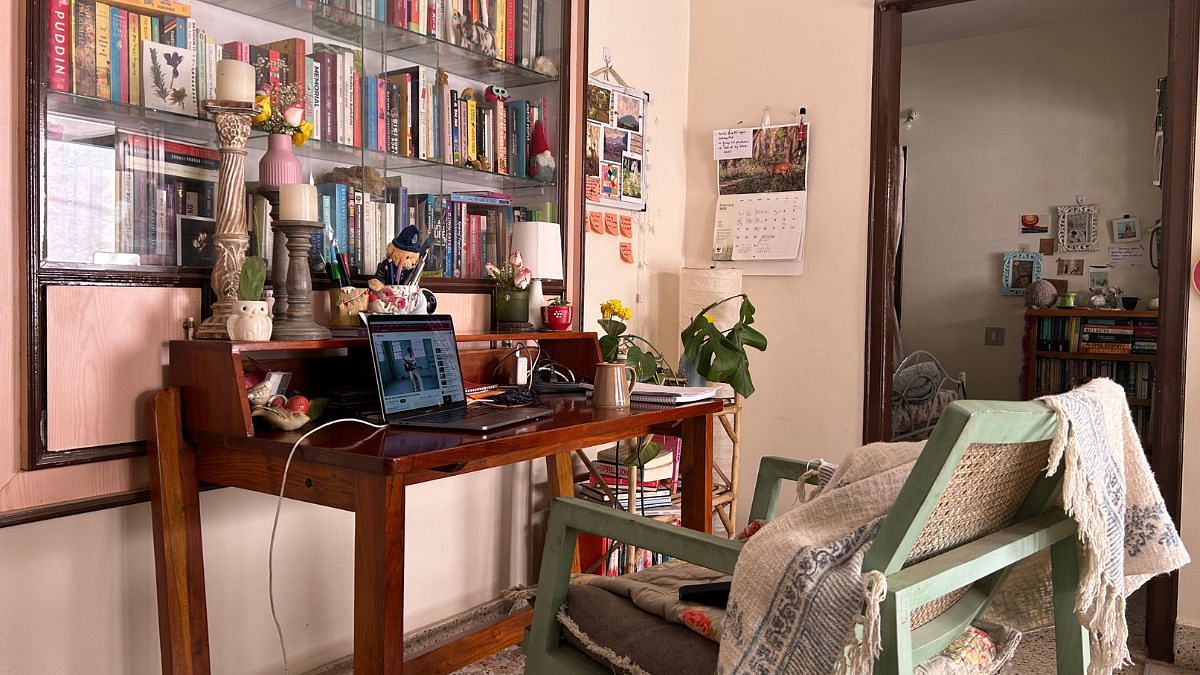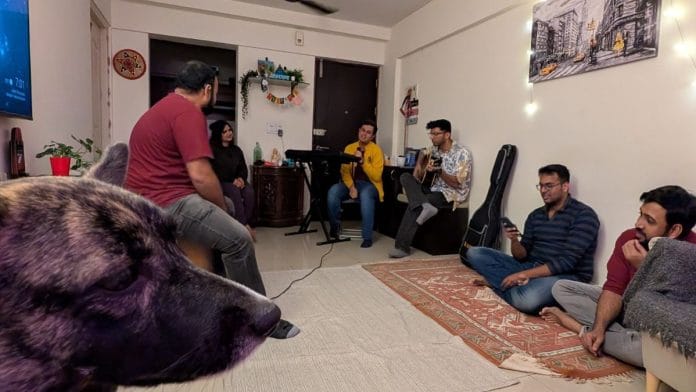Bengaluru: After a long, exhausting workday, 41-year-old Apeksha entered a cosy, two-bedroom house in Bengaluru’s Indiranagar and went straight to bed. The nap lasted two hours. Her two-year-old son wasn’t there demanding her attention. She didn’t have to make evening supper for her husband and in-laws either.
Because this wasn’t her home. It was Meghna Chaudhary’s—among a rare few in Bengaluru who have opened their personal homes as safe spaces to combat urban loneliness and stress. These are the proverbial ‘third spaces’ – a place outside of the usual home and office.
Located around the choked, congested and high-pressure areas like Koramangala, Indiranagar, and HSR layout, these spaces allow small, intimate gatherings of strangers, away from the city’s ever-expanding nightlife, long commutes and grueling work. It is a refuge and escape for the weary, harried Bengaluru residents. It is where they can unwind. One can paint, read, sing, nap or even do nothing in these spaces. These spaces offer what restaurants, clubs and cafes can’t.

“I just wanted a space where I didn’t have to be accountable to someone for a few hours. Her house offered me a space to rest,” said Apeksha, who stumbled upon Chaudhary’s third space via Instagram.
It’s a quieter, more affordable alternative to cafés and bars. But more than that, these third spaces provide a rare sense of companionship. In a hyper-connected city like Bengaluru, loneliness still creeps in—especially for those unwilling to spend on commercial spaces. It is, in a way, the leisure equivalent of co-working spaces. Only it is informal and run by private citizens in their homes.
“In a city that is recognised for its innovation and high tax contributions, a place to recuperate from such daily struggles is relevant; People need social connections, community activities, and proper rest to navigate daily life. These third spaces offer just that,” said Varini G, a Research Fellow at the Vidhi Centre for Legal Policy, Karnataka, who works on issues related to urban governance and planning.
Where organic friendships bloom
A small white gate on the first floor of a house in Indiranagar leads to Chaudhary’s third space. She greets everyone with a warm hug—and so does Millie, her deaf rescue dog. From the moment one steps inside, there’s only one rule: that there are no rules.
“The world doesn’t let women and marginalised people occupy space freely. We’re always told to perform or behave a certain way. I wanted to create a space where women and queer persons could just exist, without any societal expectations,” said Chaudhary, originally from Assam but living in Bengaluru for the past 10 years.
Currently working for a mental health company and training to be a therapist, Chaudhary sees this as a first step toward providing support. “Until I can offer therapy and other resources, this is one way I can create a safe space for them,” she said.
Just before entering her home, visitors pass a cozy art nook with a table, chairs, paint supplies, and clay. Inside the hall, they are met with plush sofas draped in blankets, a desk adorned with flowers and candles, and a rug lined with pillows. A separate room offers a white comforter and pillows for naps, along with a hot water bag for those experiencing menstrual cramps.

Using a spreadsheet link on Instagram, Chaudhary schedules up to two visitors daily between 12 PM and 4 PM. Throughout the day, the space remains quiet, with the occasional sounds of the soft tapping of keys, passing vehicles, and Millie’s gentle snores.
“Millie doesn’t have boundaries. Please beware,” she warns every visitor while giving a tour of the space.
For some, the presence of a dog has made the space feel even more like home. “One visitor had lost her dog years ago, and being with Millie brought her a deep sense of comfort,” Chaudhary recalled.

Several such organic friendships have formed in her third space.
In January, a 20-year-old journalist turned up at Chaudhary’s house for a few hours to write an article. She ended up meeting a 35-year-old former journalist there. While Chaudhary was working inside on her desk setup, the two women took a seat at the art nook. “I could hear them talk about how difficult the profession is. But the former journalist reassured the younger one, urging her to keep her fire alive,” Chaudhary recalled.
While some found comfort in conversations, others found it in the silent company of other women.
Aishwaria Sonavane, a researcher of Pakistan Studies at the Takshashila Institution, was looking for a quiet space to do her research for the day. “I work in a beautifully chaotic office, and could use a quiet space one Monday to write,” said Sonavane, who visited Chaudhary’s space earlier this month.
To their surprise, both Chaudhary and Sonavane realised that they in fact lived on the same lane but never crossed paths. “For me, this was a quiet, no-expectation space was a relief from the mundanity of my own home and office,” said Sonavane. She has traditionally worked out of cafes and parks, but found them to be ‘overstimulating’.
“They generally demand constant awareness and vigilance about how we take up space. But here, we had the liberty to just be,” she said.
Also read: Bengaluru traffic police get an image makeover. A new museum shows them as heroes
Community of music lovers
In another quiet corner of Koramangala, eight to 10 strangers, all between 25 and 40 years old, sat in a circle. One strummed a ukulele, another played a piano, their voices blending as they grooved to Lucky Ali’s O Sanam. This wasn’t a jam night at Toca or What’s In A Name—it was happening in a small apartment, far removed from the city’s usual entertainment spaces.
“We sit in circles and engage in different art forms that have saved us from loneliness from time to time,” said 31-year-old Ammu, who started the ‘Circles’ third space in December 2024. Revolving only around dance, movies, music, and dance, Circles is a 90-member community and it’s growing every day. The members take turns to use each other’s houses as a third space to engage in these art forms collectively.

Ammu, who grew up in Kerala, moved to Bengaluru for her master’s degree but later relocated to Canada for work. “I was abroad for two years. But I was missing that level of intimacy and openness that one finds back home,” she said. So, she returned to Bengaluru in 2021, only to realise that the city was changing, too.
The start-up employee pointed out that most places centered around music and other art forms in the city came with steep cover charges and an unspoken expectation of drinking. This prompted her to post on X, asking if anyone was interested in home-based art gatherings. The response was overwhelming.
“Around 100 people filled out a Google form listing their interests. It showed me that so many people in this city were looking for connection,” said Ammu, who then patiently sorted the interested members into different circles — dance, movies, and singing.
Their first jam session, hosted by Sneha—a 40-year-old entrepreneur and music lover—took place in her home at HSR Layout on 7 December. “Bangalore is only known for pubs and the traffic but many of us don’t fit into that crowd. We want a space where we can just be comfortable in our own skin,” said Sneha, who used to work with Ammu in the same organisation four years ago.

Before the session began, Sneha carefully set up her instruments—a microphone, piano, ukulele, cajón, and guitar—ready for whoever wished to play. Slowly, people started trickling in, picking up an instrument and settling into a stranger’s home as if it were their own. They played some old Hindi classics of AR Rehman and Lucky Ali.
“We end up meeting people who share our love for art, and that feeling is something special,” Sneha said. “Since we don’t know each other too well at first, there’s no judgment—just music and connection. Who wouldn’t want a space like that?”
Now, she’s preparing for the next session, eager to bring more people into the circle. She wants to create a set playlist this time with everyone’s favourite artists.
Home jam sessions have in fact become the new comfort space for music lovers in the city. When 40-year-old Harish Manav realised that a mundane software engineer job wasn’t for him, he quit and started focusing on his passion — music. It all started casually, with him teaching a few former colleagues how to play the guitar just for fun at his home.
“I never expected to enjoy teaching so much,” Manav said. “Watching them light up when they finally switched smoothly between the C and G chords was fulfilling.”
What started as a low-key affair in 2022 took off in mid-2024 when he noticed more people on Reddit searching for house jam sessions. Manav recalled one such member, 35-year-old Rahil, who had recently moved to the city and was struggling to find friends.
“He had a terrible experience with brokers and landlords—he was even scammed by one. It left a bad taste in his mouth. He dreaded going home every day because there was nothing to do and no one to talk to,” said Manav, who found Rahil’s post on Reddit explaining his ordeal.
The two instantly connected, and today Rahil has his own band of musicians through Manav’s third space.
Hiccups on the way
Despite the growing number of accessible third spaces, creating a truly diverse and inclusive community remains a challenge. At Sneha’s first music circle, for instance, only two women attended, while the rest of the group was predominantly men.
“We notice that men are generally more comfortable signing up for these events, while women tend to be more hesitant. Some have even left our WhatsApp groups after initially committing to attend,” said Ammu.
Building trust takes time, so she personally reached out to the women in the community, asking how the space could be made more accessible and welcoming for them. After in-depth discussions, Ammu decided to open a woman-only circle as well, just like Chaudhury. “This way, we hope women will feel seen and supported,” she said.
The group, which already has 20 members, will host its first gathering in March—a jewellery barter exchange at one of the members’ homes.
Meanwhile, what began as a free space for jam sessions now comes with a small fee. To cover the cost of maintaining his equipment, Manav now charges Rs 200 per session.
Chaudhary, too, is considering a small Rs 50 fee to cover WiFi costs if her initiative gains traction.
While researchers applaud such initiatives, they believe that privatisation of leisure will continue to push people away who are already on the margins.
“It is fair on part of the host to impose a small fee. But it can become a slippery slope. Soon only people with disposable income will be able to afford such leisurely activities,” said Varini.
Meanwhile, back at Chaudhary’s third space, a new visitor settles in to rest and read. A lover of books herself, Chaudhary has curated a display of short stories in her hall. She recalls a line from May Sarton’s Journal of a Solitude: “I am the protector of my own solitude.” For her, this space is meant to do just that.
(Edited by Ratan Priya)






